No exceptions.
OP: “Again” by Beverly
I think it could be said that my one real worry about this Fruits Basket remake was simply a matter of competence. Would it be screwed up the new staff, perhaps worried a little too much about making the mangaka happy? That was a valid concern, especially with a director who doesn’t have a proven track record of success, but for me it’s pretty well been put to bed after two episodes. These were handled just fine, better than fine in fact – damn well. There was never any question about quality the story itself, so with that resolved I feel like I can pretty much rest easy on this score.
However, that’s where things start to get complicated for me. To be blunt, I find the experience of watching Fruits Basket again after all these years a very strange one indeed. It’s making me feel things I haven’t felt for a very long time. To a certain extent that would be true of any reboot of an old series, but Furuba made me feel things quite deeply, so much so that those feelings have become ingrained in my memory even when I thought I’d mostly forgotten them. To feel them again now is to be, effectively, transported back into the me of 15 years ago. And how could that not be an unsettling sensation?
I guess it’s to the credit of the new version that it’s able to do that, though again I think the bar here was more not screwing it up than doing anything exceptional. When you consider that we’re only two episodes (which adapted about three chapters) into the story, it’s remarkable how much Furuba has already developed the dynamic amongst the three main characters (Shigure’s position is complicated, narratively speaking, but that’s a discourse for another moment). I give all the credit to mangaka Takaya-san here, because it’s her ability to use a carefully chosen word as either a scalpel or a bludgeon – to equally devastating effect – that makes this kind of rapid development possible.
It’s mostly Yuki (especially early in the series) that uses those weaponized words. When I say you have to choose a side, half-kiddingly or no, it’s not really a joke. If you don’t have strong (and I mean strong) feelings one way or the other about Yuki and Kyou, I’m not sure you’re a candidate to fully buy in to what Fruits Basket is selling. Everyone in the Sohma family is a victim, more or less, but as soon as I was introduced to this household there was no question where my sympathies lay. I felt immediately and totally vested in this, with no middle ground, and that’s a significant reason why Furuba impacted me as much as it did (though the arcs for some of the supporting cast members wound up being arguably more compelling than the leads’).
This is the paradox of Fruits Basket – there’s more to everything and everyone than it seems at first glance (even literally, given the nature of the Sohma curse). But some things are exactly as they seem, and my visceral reaction to them never changed over the course of the entire series. Again, it’s the matter of a well-chosen word – from Yuki – here: “outsider”. “Sometimes not being punched hurts worse”. His ability to cut to the heart of the matter is truly frightening in its way. In this sense (as in many) he and Kyou are truly opposites. Kyou is, as Shigure points out, both inexperienced and inept at dealing with other people. But Yuki is a savant at it – he reads people like a book, and has an eloquence that allows him to use that knowledge to full advantage.
Still, he does misread Tohru in one very important sense – she’s not “sickened” when she learns his true nature. This is an important interaction both as it relates to his character and hers, but for now let’s turn to the source of that word. That would be the head of the Sohma family, Akito (the great Sakamoto Maaya). A mysterious figure, Akito is clearly viewed with considerable trepidation by the other family members we’ve met, and the family head’s decisions are absolute. And one of those is that Kyou should attend the same school as Yuki (and Tohru) and live in the same house.
Kyou, for a multitude of reasons, is aghast at the idea of attending a school full of girls and baffled that Yuki should feel differently. But this is yet another area where these two are polar extremes – for Yuki, it’s a chance to get “one foot out of the Sohma cage”, and he’s just as baffled that Kyou wants so badly to get inside it. This is his curse, of course – he is that outsider that Yuki so brutally calls him, forever destined to want to join a club from which he’s been excluded. And that, of course, is a story that offers an immediate pathway to Tohru’s heart.
We’ve only seen the tip of the iceberg with Fruits Basket, especially where the cast is concerned (and again, for me the supporting cast is arguably the strength of this series). Yet in a very real sense we already know exactly what sort of story it is – the manner in which it tells that story, and the themes which are at the heart of it. While we don’t see a lot of series cut from a similar cloth these days, Furuba doesn’t seem stylistically dated in the same way its contemporary Boogiepop does (perhaps reflecting more stability in shoujo manga than light novels), which makes me believe it’s going to find a better reception from a modern audience. I already know from experience that it has its hooks in me, too deep to hope for extraction.


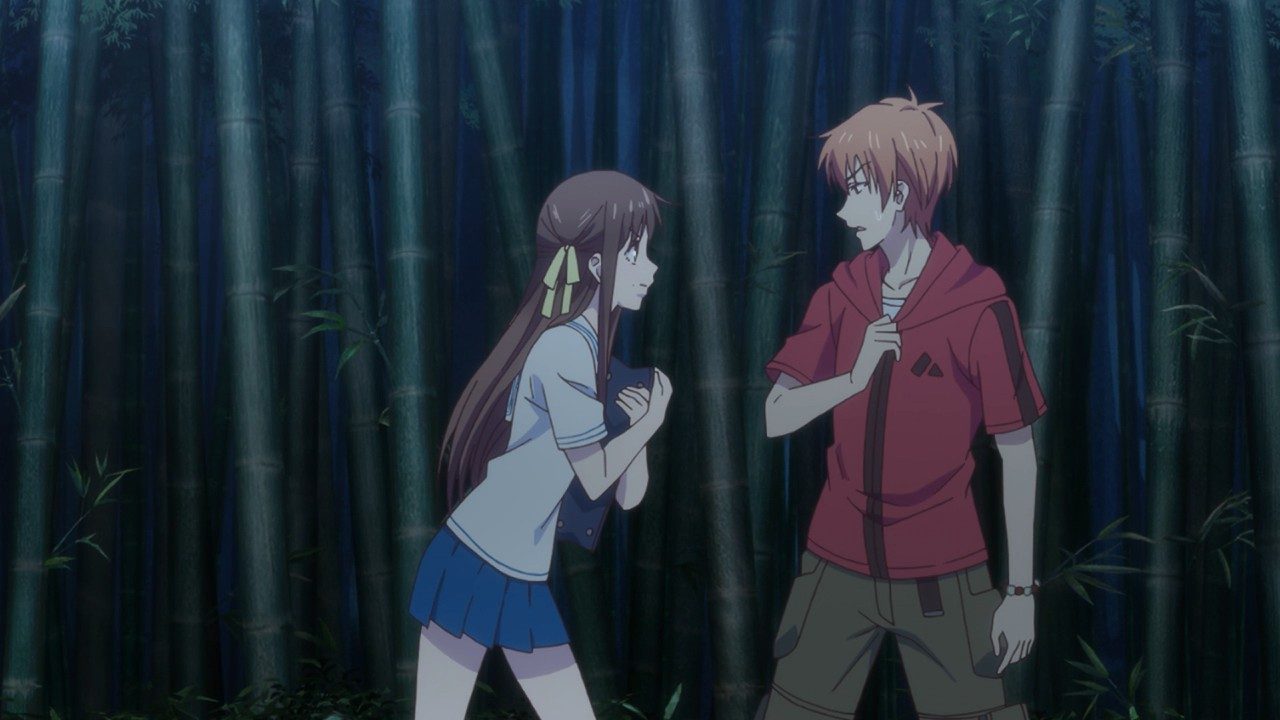
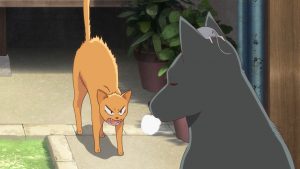
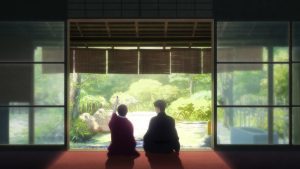

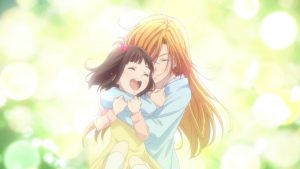
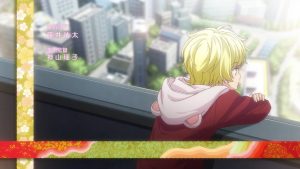
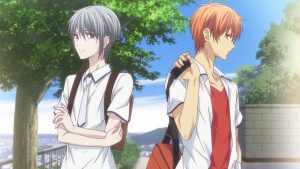



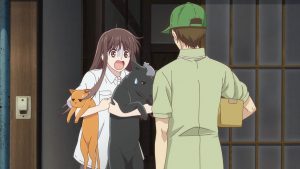

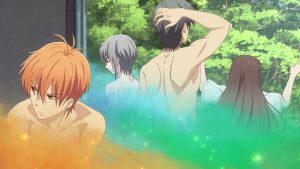
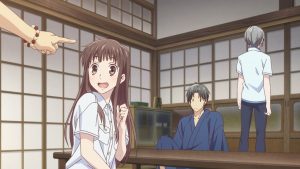
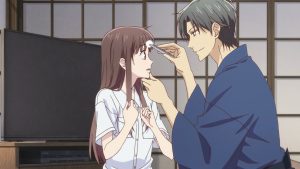
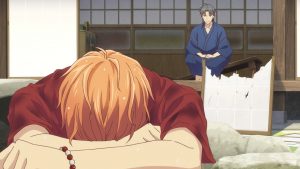
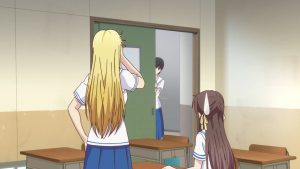
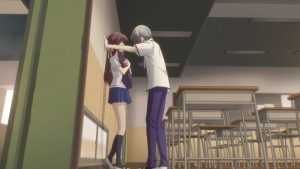
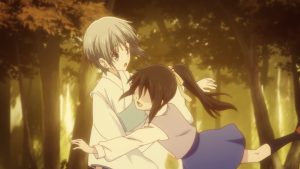
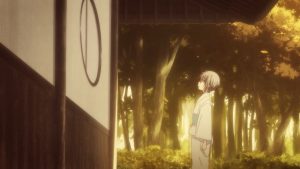
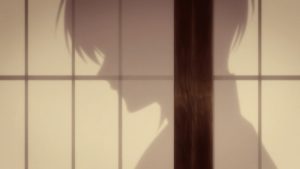
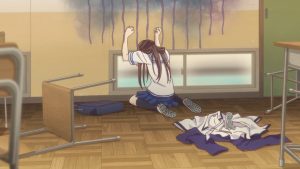
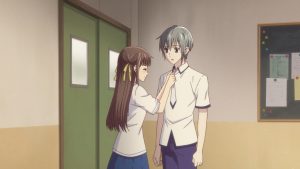
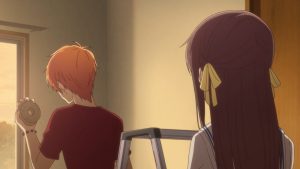
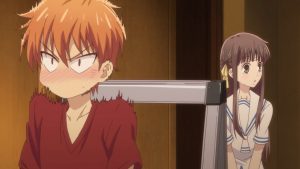
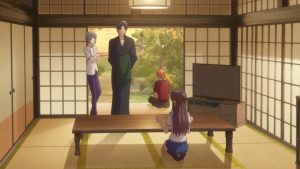
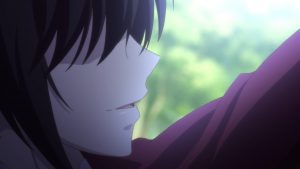
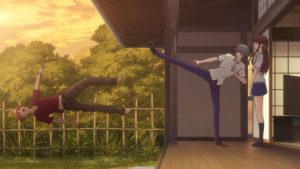
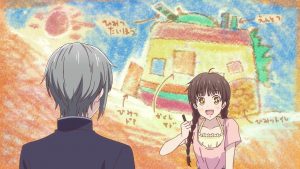
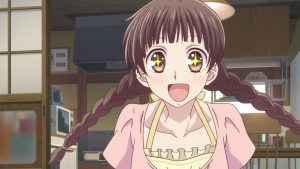
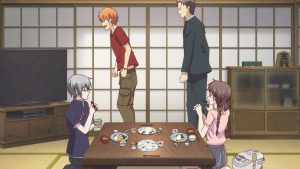
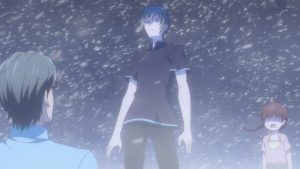

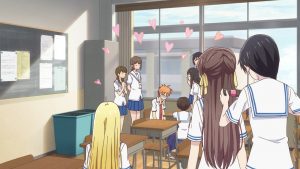
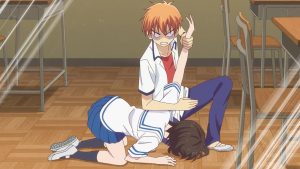
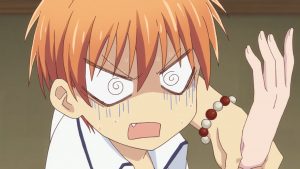

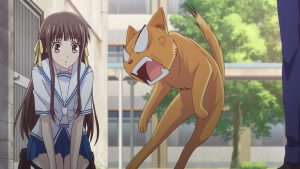
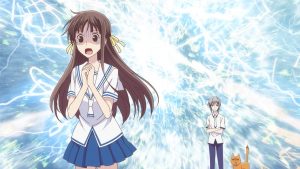
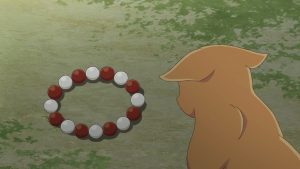
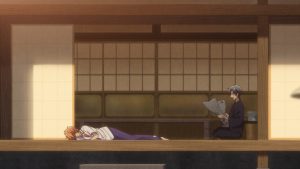
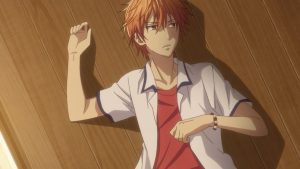
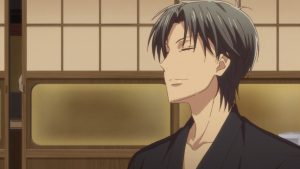




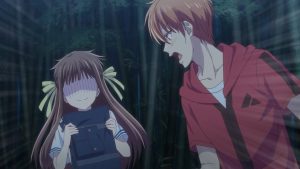
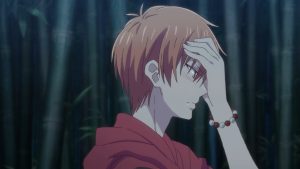

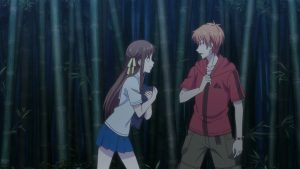
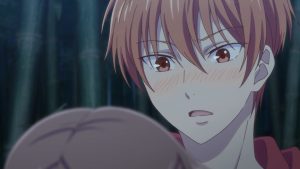

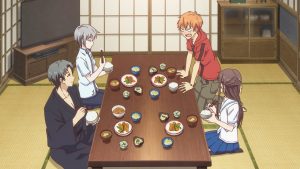
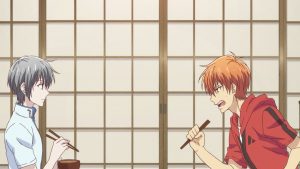


Simone
April 13, 2019 at 4:51 pmWait, so out of curiosity, where do YOUR sympathies lie? I’m not extremely invested at the moment but I certainly can relate far more to Yuki’s calculating demeanour than to Kyou’s emotional outbursts.
Guardian Enzo
April 13, 2019 at 5:48 pmMy goal was to suggest the answer without spelling it out and inadvertently spoiling anything…
elianthos80
April 14, 2019 at 3:44 amI think the anime has already dropped plenty of hints ( or shall we say foreshadowing with a 99% chance of accuracy, hat included ) actually, but good try on keeping your sympathies under wraps Enzo :°D .
Ship foreshadowing-wise: pity. I find Rat Prince quite intriguing. But WildCatBoi is the one who has the most growth potential, add to this his underdog (ah!) + outsider status and, well…
Anyway, about the rest: the comedic timing wasn’t perfect but still I at least grinned when I was supposed to, and the musical cues for the emotional key moments worked well.
Not sure if the gaseous rainbow curtains were also supposed to be funny per se beyond the censorship but uhm ok chalk my perplexity to unicorn fart memes, no fault of Furuba those ones.Tohru’s school friends are good girls. Especially fond of VibeDar Dark Lady already.
And the serious/mysterious/drama-y bits are plenty promising. Paws up.
Gracie
April 13, 2019 at 5:28 pm2019 Yuki’s voice is so generic. Nobunaga Shimazaki voiced Shinichi Izumi in Kiseijuu and Sunakawa Makoto in Ore Monogatari and did it pretty well, but since then he mostly does shounen bland voices that manage to be the least distinctive thing about the series he’s in.
I’ve been rewatching the old series and Aya Hisakawa was in a league of her own. She imbued the character with a lot of personality. Whereas here, the voice doesn’t do anything for Yuki. It’s Nanase Haruka 2.0.
Bokusen
April 15, 2019 at 4:34 amI totally agree with this. Even though some people might have not liked that Yuki was voiced by a female seiyuu, Aya Hisakawa’s performance made Yuki really memorable for me, and was part of what made me like Yuki’s character in the first place, whereas in the new series Yuki seems so unremarkable. It’s a real shame…
Ronbb
April 15, 2019 at 2:21 pmI’m still banking on everyone’s praises and its fame. At the same time, this got me to ponder on how far the social-cultural movements have gone in a decade… While I’m planning to sign up for the full journey, I’m still not feeling a thing for any characters. I guess I need to be patience and let the story intrigue me.